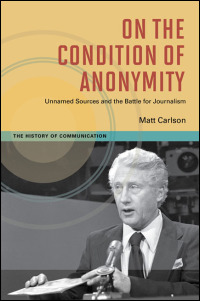 On May 2, 2011, we published Matt Carlson’s On the Condition of Anonymity: Unnamed Sources and the Battle for Journalism, which illustrates how unattributed information can be both an effective tool in uncovering necessary information about vital institutions and a means for damaging the credibility of journalists and news outlets. Dr. Carlson, an assistant professor of communication at Saint Louis University, offered to go on the record about his latest book.
On May 2, 2011, we published Matt Carlson’s On the Condition of Anonymity: Unnamed Sources and the Battle for Journalism, which illustrates how unattributed information can be both an effective tool in uncovering necessary information about vital institutions and a means for damaging the credibility of journalists and news outlets. Dr. Carlson, an assistant professor of communication at Saint Louis University, offered to go on the record about his latest book.
Q: What is the most famous case in the United States involving the use of anonymous sources?
A: The iconic anonymous source in American journalism remains Bob Woodward and Carl Bernstein’s Watergate source Deep Throat. The public didn’t know about Deep Throat until Woodward and Bernstein’s book All the President’s Men came out in 1974, but questions and theories about who Deep Throat was persisted for decades in Washington circles until former FBI official Mark Felt ended his silence in 2005. Deep Throat still plays into narratives of how journalists must have access to anonymous sources to truly hold power accountable. This may be true, but there were plenty of other players that took Watergate from a small-time break-in to resulting in Nixon vacating the Oval Office.
Q: Have there been many cases where anonymous sources are publicly revealed or do most anonymous sources remain anonymous?
A: If you look in a newspaper, you are likely to encounter unnamed sources sprinkled throughout the news coverage. For this most part, this cloak of anonymity benefits sources trying to get information out there without having their name attached as well as journalists looking for a story. As long as this arrangement holds, we mostly don’t have any idea who these sources are. It is only the rare exception when journalists are legally forced to unmask their sources.
Q: Do you think online journalism will increase or has increased the use of anonymous sources?
A: The Web has changed anonymity in fundamental ways. Look at Wikileaks, for example. Now sources can circumvent journalists and go right for the Web, particularly with documents. In many ways, this is a feature of the technology and likely to grow in the years to come. The biggest shift is that anonymous sources no longer need rely solely on journalists to get the word out. This raises new questions of credibility we will have to figure out.
 Q: Where do you think the path of anonymity will take journalists in the future (avoiding or utilizing it more or less)?
Q: Where do you think the path of anonymity will take journalists in the future (avoiding or utilizing it more or less)?
A: Anonymity ebbs and flows. It became such a big issue in the early 2000s because after September 11, 2001, the big stories were sensitive national security stories. With these types of issues, sources are reluctant to give out information while journalists are digging to find out what is going on in the name of our country. Hopefully, this will become less an issue in the years to come, but certainly we will see another spike in unnamed sources in the future.
Q: What steps would you suggest journalists take before using anonymous sources in their stories?
A: Journalists need to step back and be honest about who is being served by withholding a source’s identify. If the source is just trying to take a jab at someone or avoid the spotlight, this may not be worth it. Also, the journalist should ask if this is really in the public interest rather than the interest of the journalist seeking a scoop. These big questions need to be asked every time.
Q: Do you think that journalists are ever hindered by writing a controversial story because of the possible outcomes it may produce?
A: These are lean times for the news media and any use of anonymity carries the risk the journalists will be subpoenaed to unmask the source. That means hefty legal bills and even fines for violating a judge’s orders. It takes a real financial commitment and I fear that some news organizations might back away from legitimate stories that would serve the public interest out of fear of having to spend this kind of money. That would be a loss for all of us.
Q: What impact do you wish for your book to have on the media, or the reader’s outlook on the media?
A: My goal is for journalists and the public to think more deeply about this topic and avoid taking an absolutist stance for or against anonymous sources. It is true that this practice is used too frequently and frivolously, which I do think hurts credibility. But I also believe firmly in the need for a strong, independent press that aggressively digs to find out what our societal institutions are up to. Casting aside anonymity as too dangerous makes this task so much more difficult. So I hope that my book causes readers to stop and reflect on this topic so that they can draw their own conclusions.
